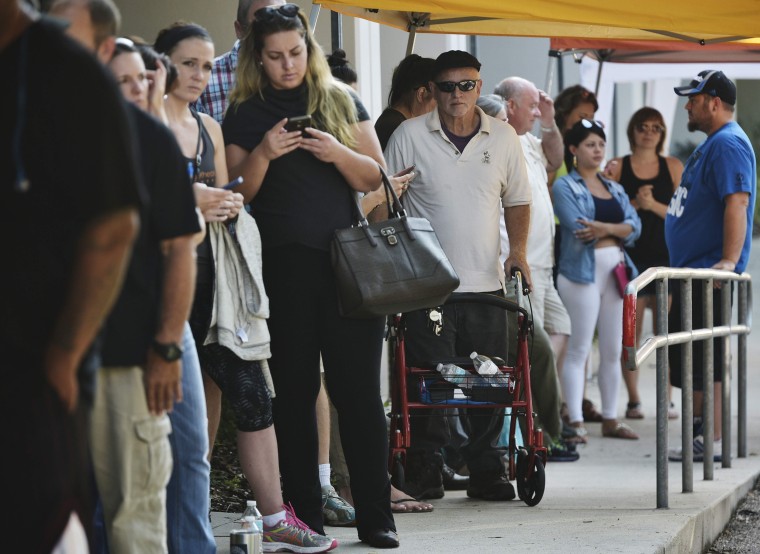ORLANDO — Thousands of people have poured into blood banks or waited outside, melting in the mid 90-degree heat, since Sunday to meet an urgent call for blood donations after so much of it was spilled here on a nightclub floor. Many were sent home, having completely overwhelmed the staff and resources available to tap their veins. But for the community perhaps most affected by the horrific massacre, it was outdated regulations that kept them away.
"I want to be able to help my brothers and sisters that are out there, that are suffering right now," Garrett Jurss, a gay man, told NBC OUT. "But I can't, and I feel helpless."
Under the Food and Drug Administration’s (FDA) current guidelines, gay and bisexual men are required to remain celibate for a year before they can donate blood. It’s a recently-adopted policy that, until this year, used to be even more restrictive. Prior to December, any man who’d had sex with another man at any point since 1977 was barred from donating blood for life.
The FDA justifies its policy by pointing to higher rates of HIV infection experienced nationally among gay and bisexual men. But on World Blood Donor Day, and especially in the wake of Sunday’s shooting at a gay nightclub, LGBT advocates and allies insist it’s time for the rule to go.
“It doesn’t make sense,” said Jorge Hamana, a pathologist who donated blood Tuesday at the University of Central Florida in Orlando. “They have so many tests they can do with the blood so you can know that it’s good to be received by someone else. I think it’s a bit discriminating, to say you can’t give blood if you’re gay.”
Related: Reports Fuel Speculation About Orlando Shooter's Sexuality
In the U.S., blood banks currently screen every donor sample using a process known as Nucleic Acid Testing (NAT), which can pick up HIV in a unit of blood as soon as nine days after the donor was infected. That kind of scientific accuracy, LGBT advocates argue, far outweighs the statistically higher risk of HIV infection that gay and bisexual men face.
“If their blood’s been tested, then they should be allowed to donate,” said 18-year-old Nikki Young, a student at the University of Central Florida, while waiting in line to donate Tuesday. “That’s just commonsense.”
Further frustrating donors: In Orlando, blood banks are still operating under the FDA’s old lifetime ban on gay and bisexual men, turning away people like Jurss based on their first sexual encounter with a man, not their most recent.
Susan Forbes, vice president of marketing at OneBlood, a blood donation center in Florida, told NBC the FDA had only last month updated its forms to reflect the new policy, and that OneBlood centers would be accepting donations from gay and bisexual men who’ve been celibate for a year “soon.”
“Our whole software system has to accept the changes, we have to do training with the staff… We are a very large blood center, and there are a lot of people who need to be taught what to do,” Forbes said. “Trust me, we have been working very quickly to get this done.”
Still, the news of not being able to donate blood after Sunday’s shooting came as a devastating blow to many in the gay community.
“Yesterday, a guy came in saying his friends were in the hospital and that he had the same blood type. He was trying to donate blood, but they wouldn’t let him,” said Herb Voyles, a 49-year-old donor and volunteer at a OneBlood center on Michigan Street. “He started crying.”
Related: How Should Parents Talk to LGBTQ Youth About Orlando?
According to Anthony Hayes, vice president of public affairs and policy at the Gay Men’s Health Crisis, OneBlood is probably not the only blood donation center to still be operating under the FDA’s old rule.
“The new regulations were just approved in December, so it doesn’t surprise me from a logistical standpoint that blood banks are still following the lifetime ban,” said Hayes. “My guess is that with the FDA moving from a lifetime ban to a one-year celibacy ban, and rolling that out across the country, there are probably other folks who may not have implemented or received all they need.”
Even with logistical and regulatory hurdles that require blood banks to turn gay and bisexual men away, Forbes said they had still received a stunning number of donations since the shooting. On Sunday, she said, OneBlood’s 80 donor centers collected over 5500 units of blood; the next day, they collected 7500 — nearly four times as much as they typically receive on a given day.
“The immediate need of what was going on has been met and we are not in a crisis situation anymore,” said Forbes.
Gay and bisexual men, meanwhile, continue to press for their right to donate.
“It’s insulting to a lot of the LGBT population that this is still an issue,” said Russell Walker, community development director of the AIDS organization Hope & Help. He has been directing LGBT friends who want to donate to OneBlood, despite the FDA regulations.
“Remember, you’re celibate!” he called after one man on his way out the doors of the GLBT Community Center of Central Florida Monday. The two men laughed. But Walker soon grew serious again.
“There are so many outdated things we’re fighting against,” he said. “We’re getting there. This is just another fight with a massive light shone on it.”
John Brecher and Sylvia Cunningham contributed to this report.
